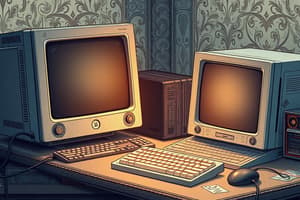Podcast
Questions and Answers
What is the function of a keyboard?
What is the function of a keyboard?
Converts a user's keystrokes into electronic signals.
Describe the role of a mouse in computing.
Describe the role of a mouse in computing.
Enables users to navigate a computer's user interface by moving a cursor across the screen, select options, click on links, and control the computer's cursor.
What are the fundamental principles and applications of a scanner?
What are the fundamental principles and applications of a scanner?
The scanner is used to convert physical documents or images into digital format for storage or processing.
Explain the significance of a monitor in the context of personal computing.
Explain the significance of a monitor in the context of personal computing.
What is the primary function of a printer?
What is the primary function of a printer?
What is the function of a scanner?
What is the function of a scanner?
What are the different technologies available for printers?
What are the different technologies available for printers?
Name two software tools used for processing scanned documents.
Name two software tools used for processing scanned documents.
Explain the capabilities of modern monitors.
Explain the capabilities of modern monitors.
How do the integration of these devices benefit users?
How do the integration of these devices benefit users?
Flashcards are hidden until you start studying
Study Notes
The Use of Input and Output Devices: A Focus on Keyboard, Mouse, Monitor, Scanner, and Printer
In the realm of personal computing, input and output devices play a crucial role in facilitating interaction between users and digital systems. These devices enable communication, data processing, and information presentation, making computers a powerful tool for everyday tasks and creative endeavors. This article will explore the fundamental principles and applications of keyboard, mouse, monitor, scanner, and printer – five essential devices in our digital ecosystem.
1. Keyboard
A keyboard is a standard input device that converts a user's keystrokes into electronic signals. Comprised of keys that are pressed to input specific characters or commands, a keyboard remains the most common and widely used input device in computing. Keyboards are available in a variety of designs, including wired and wireless connections, as well as ergonomic and compact options.
2. Mouse
The mouse is a pointing device that enables users to navigate a computer's user interface by moving a cursor across the screen. Through a combination of buttons and scroll wheel, a mouse allows users to select options, click on links, and control the computer's cursor. Mice are available in both wired and wireless connections, including trackballs and touchpads for alternative input methods.
3. Monitor
A monitor (also known as a display) is an output device that displays visual information processed by the computer. Monitors are available in a range of sizes, resolutions, and technologies, including CRT, LCD, LED, and OLED screens. Modern monitors are capable of producing high-quality graphics and videos with fast refresh rates and low response times.
4. Scanner
A scanner is an output device that captures and digitizes physical documents or images, converting them into digital formats that can be easily edited, searched, and shared. Scanners come in various formats, such as flatbed scanners and sheet-fed scanners, and can scan at varying resolutions and colors. Scanned documents can be processed and manipulated using software tools, such as image editors and OCR (Optical Character Recognition) software.
5. Printer
A printer is an output device that produces hard copies of digital documents and images. Printers are available in various technologies, such as inkjet, laser, and thermal, and can produce a wide range of paper sizes and media types. Printers can also produce different types of prints, including text, images, and color, with varying paper handling capacities (e.g., duplex printing, auto-duplexing).
The integration of these devices enables users to interact with their computers in intuitive and efficient ways, allowing for a multitude of tasks, including data collection, editing, and presentation. These five devices are often combined to create a complete computer system that is capable of performing a wide array of tasks, from basic computing to complex multimedia projects. Understanding the principles and applications of these devices is a valuable skill in an increasingly digital world.
Remember that as technology continues to evolve, new devices and methods of input and output are being developed. Keeping an open mind and staying informed about these advancements will help ensure that you can make the most of your computing experiences.
Studying That Suits You
Use AI to generate personalized quizzes and flashcards to suit your learning preferences.




